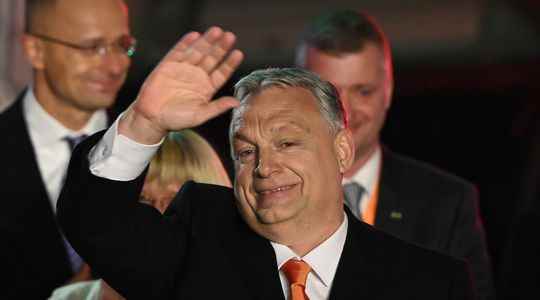Vladimir Putin can be proud of his most faithful apostle in Europe. At 58, Viktor Orban, who has just won the legislative elections in Hungary, is preparing to become the leader of the European Union who will have spent a record number of years in power: almost twenty years! With the exception of an unfortunate parenthesis that he did not appreciate, won by his left-wing rival Ferenc Gyurcsanyi (2002-2006), he is beginning his fifth term, and the fourth consecutive since 2010. Soon twenty years, therefore , at the head of the great right-wing nationalist popular party that he fashioned with his boot, Fidesz, and of this small country of 10 million inhabitants, landlocked and almost entirely in plains (puszta), of which he made a example of democratic regression. Orban accomplished the same reforms as the Russian president by attacking the NGOs, the freedom of the press, the independence of the Constitutional Court. The media, justice and electoral system are designed to serve the interests of its leader. The claimed “illiberalism” aims to limit, for the benefit of a well-locked nation, individual freedoms and Western mores deemed decadent. Orban “Putinized” Hungary, and Putin he made his political model. He is the dictator he would like to be able to be and who knows how to hold his people, his police, his judges, his media, his banks, his oligarchs. He is the strong man who challenges the Atlantic Alliance and the European Union, this Western bloc weakened by its values of humanism and openness to migrants, who threatens Christian traditions, who dares to impose sanctions on sovereign countries in the name of international rules and the rule of law. He is the guru of populist nationalists in Europe, of which he himself is a leader. By being re-elected, Orban becomes with Putin – and the Turkish president Erdogan – one of the three tenors in longevity on the European continent. Since Sunday, he has been an autocrat confirmed in his power, both a member of the EU and in the service of the EU’s number one enemy: Vladimir Putin.
Embarrassment
The war waged against Ukraine puts Viktor Orban in trouble. Like some French candidates in the presidential election who are trying to make people forget their admiration for the Russian president, the Hungarian Prime Minister has engaged in a balancing act in his election campaign. He does not want to anger Vladimir Putin, a solid ideological and commercial ally, on whom the country depends more than 80% for its gas. But how can he, the former liberal revolutionary who won over Hungary by giving a speech in Budapest’s Heroes’ Square in 1989 calling for the departure of Soviet troops and the holding of free elections, can he support the arrival of Russian troops in a Ukraine that does not want them? How can he, the nationalist who celebrates the Hungarian revolution of 1848 each year and refers so much to history, make people forget his crushing by Russian and Austrian forces? How can he not condemn an invasion that reminds Hungarians of the Russian tanks that entered Budapest to crush the 1956 uprising?
READ ALSO >> “Hungary under Orban”: diving into the heart of a changing country
“Viktor, choose your side!”
The Poutine of the puszta, like others in France, has found a formula: “strategic calm”. Hungary must “stay out of this war”, which he says is “not ours” – despite the Hungarian minority in Ukraine, the long common border between Hungary and Ukraine, the tens of thousands of refugees who have already crossed it. He votes for sanctions against Russia, but is the only one in the EU and NATO to refuse any military support to Ukraine. President Zelensky challenged him: “Viktor, you have to choose your side!” But Viktor does not choose. Will the “Hungarian model” he claims – friend of the Kremlin and member of the EU – resist the war? His support for Putin has already caused him to fail to form a right-wing nationalist group in the European Parliament. His Eurosceptic allies of the Visegrad group founded in 1991 – Poland, Slovakia, the Czech Republic -, massively committed to supporting the Ukrainian resistance, are now turning their backs on him. Viktor Orban presented his triumphant victory as a challenge to Europe – “so big, he said, that you can probably see it from the Moon, and certainly from Brussels” . If his ally Marine Le Pen does not win the presidential election, if Putin does not win the war, Hungary is preparing for four years of solitude. Yes…
